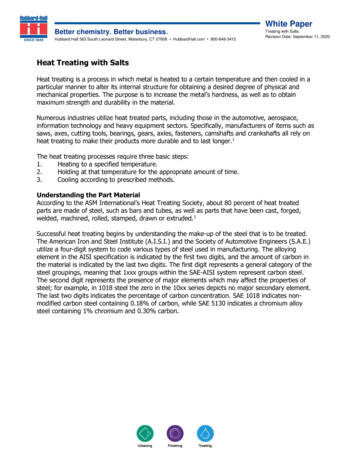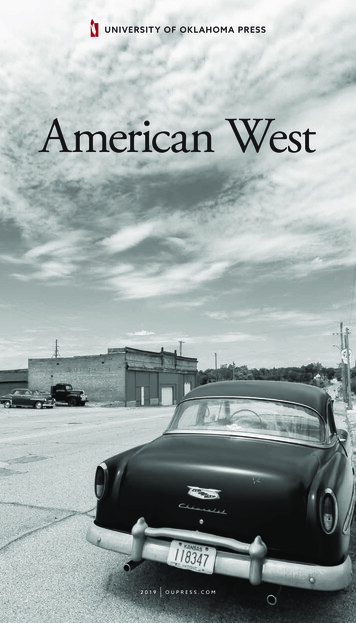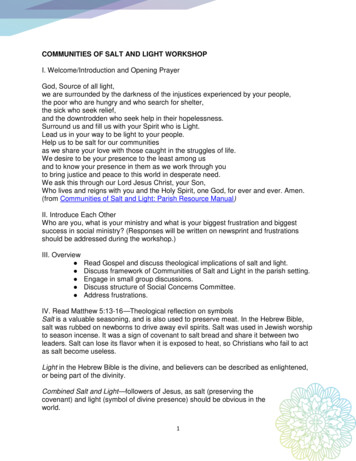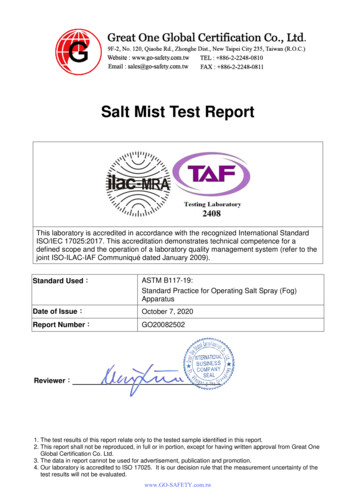
Transcription
Coming Fall 2020salt&lightBible Study for Anabaptist ChristiansJoining God:Relationship and Worship
faqWHAT IS SALT & LIGHT?Salt & Light is a new quarterly Bible study tohelp you encounter God more deeply throughChrist-centered Sunday school lessons. Salt &Light succeeds the Adult Bible Study curriculumthat Menno Media has published for many years.Each weekly Salt & Light session includes aspiritual practice alongside thought-provokingcommentary and discussion prompts. Daily Biblereadings, free online essays, reproducible teachingaids, and suggested resources for additional studyhelp participants make connections throughoutthe week. The new design is simple, attractive, andeasy to read, and each weekly session includes theaccompanying NRSV Scripture text. Sal y Luz isthe Spanish-language version.HOW ARE THE BIBLE OUTLINESDEVELOPED FOR SALT & LIGHT?Salt & Light Bible outlines are developed by ateam of Mennonite and United Methodist Biblescholars and educators who have a passion forcreating exciting and transformative Bible studies for adults. This partnership provides complete freedom to align the outlines and resultantBible studies with our Anabaptist theology andpractice. MennoMedia is highly involved in thedevelopment of this new curriculum, from the inception of each Bible study session to publication.WHAT HAPPENED TO THE UNIFORMSERIES/INTERNATIONAL SUNDAYSCHOOL LESSONS?The work of the Committee on the UniformSeries continues. MennoMedia has chosen to nowdevelop its own outlines apart from this series.WHY ARE MENNONITES NO LONGERA PART OF THE COMMITTEE ON THEUNIFORM SERIES (CUS)?When CUS developed the six-year cycle of Biblestudies for 2022–28, Menno Media editors becameconcerned about the intertextual approach usedto develop the outlines. This resulted in themesthat are two or three quarters in length with aheavy representation of Old Testament texts andless emphasis on the Gospels. We saw this as anopportunity to work to develop Anabaptist Bibleoutlines.WHAT IS GAINED BY DEVELOPING ABIBLE STUDY CURRICULUM “FROM THEGROUND UP”?By developing our own outlines, we are creating acurriculum that grows from our Anabaptist biblical interpretation and practices.WILL A LARGE-PRINT EDITION BEAVAILABLE?Yes, a large-print edition of the participant guidewill be offered.WILL A SPANISH TRANSLATIONVERSION BE AVAILABLE?Yes, Sal y Luz will be available as a downloadable, reproducible participant guide and leaderguide.WILL THE SESSION PLANS IN THELEADER GUIDE HAVE THE PARTICIPANTGUIDE MATERIALS AS AN INSET?Yes, the layout is similar to the familiar AdultBible Study teacher’s guide.WILL RELATED ONLINE ARTICLES BEAVAILABLE FROM MENNOMEDIA?Yes, Salt & Light Online will feature articles connecting the Bible studies with current events inthe church and the world.
12.November2020November22, 22,2020Unit 3: Focus of Our WorshipHowCanCanWe WeKeep12. HowKeepfrom Singing?PurposeTo worship God, who created everyone and everything that lives on this earth,and to consider how to share the good news of Jesus.Background ScriptureActs 17:16-34Scripture TextActs 17:16, 22-34 NRSV16While Paul was waiting for them inAthens, he was deeply distressed tosee that the city was full of idols.22Then Paul stood in front of theAreopagus and said, “Athenians, I seehow extremely religious you are in every way. 23 For as I went through thecity and looked carefully at the objects of your worship, I found amongthem an altar with the inscription, ‘Toan unknown god.’ What thereforeyou worship as unknown, this I proclaim to you. 24 The God who madethe world and everything in it, hewho is Lord of heaven and earth,does not live in shrines made byhuman hands, 25 nor is he servedby human hands, as though he needed anything, since he himself givesto all mortals life and breath and allthings. 26 From one ancestor he madeall nations to inhabit the whole earth,and he allotted the times of their existence and the boundaries of the placeswhere they would live, 27 so that theywould search for God and perhapsgrope for him and find him—though68bold key verseindeed he is not far from each one ofus. 28 For ‘In him we live and move andhave our being’; as even some of yourown poets have said,‘For we too are his offspring.’29Since we are God’s offspring, weought not to think that the deity islike gold, or silver, or stone, an imageformed by the art and imagination ofmortals. 30 While God has overlookedthe times of human ignorance, nowhe commands all people everywhereto repent, 31 because he has fixed aday on which he will have the worldjudged in righteousness by a manwhom he has appointed, and of thishe has given assurance to all by raising him from the dead.”32When they heard of the resurrection of the dead, some scoffed; butothers said, “We will hear you againabout this.” 33 At that point Paul leftthem. 34 But some of them joinedhim and became believers, includingDionysius the Areopagite and a woman named Damaris, and others withthem.12. November 22, 2020
Spiritual PracticeTake your Bible and go outdoors. If you can find a place away from a lot ofhumanity’s noise, that is even better. Pay attention to the details around you:1.2.3.4.5.Close your eyes and listen. Just listen.Turn your attention to the smells you notice for several minutes.Open your eyes. Spend 10 minutes simply seeing things.Move around and touch the world around you.Read Psalm 96 or Psalm 104:1-5, 31-34, remembering and connectingwith your sensory experience.MONSing to the Lord a New SongPsalm 96:1-13TUEWorship with Our Whole BeingPsalm 104:1-5, 31-34WEDLife of Everything in God’s HandJob 12:1-13THUPassing Over Previous SinsRomans 3:21-26FRIBelievers at PrayerActs 4:23-31SATPreaching About Jesusand the ResurrectionActs 17:16-21SUNDaily Bible ReadingsGod Calls for a Change of HeartActs 17:16, 22-3412. HowKeepfromSinging?HowCanCanWe WeKeepfromSinging?69
DEER STANDSOkay, my hunter-friends-who-sit-in-deer-stands on Sunday morning!This is your verse! When I look down my nose at you because I was inchurch and you weren’t, just smile and say, “Acts 17:24.”When I say the sermon was so good and the singing outstanding, tellme about the birds you heard warbling their predawn songs. Tell meabout the raccoon whose bright eyes met yours as you shared the sametree. Tell me about the painted sky as the sun stroked the land to light.When I say it was good to be with the faith community, tell me aboutthe tree that moved with the wind, sighing and whispering in your ear.Tell me about the family of skunks that scurried below your stand,sporting their tuxedo suits. Tell me about the decaying leaves and thelife they support.When I say it was an uplifting hour of worship in the church, tell meyour three hours in the tree stand lifted you too.DISCOVERWhere is God? You know what comes next. “We need both.”Of course we do. If we were to take just this verse, someonemight interpret it to say, “God isn’t in our church buildings.” That’s thedanger of taking one verse and building an entire philosophy around it.We need to explore the context around it. We cross the hermeneuticalbridge that takes us into that time, place, and culture and see what wasgoing on.God’s salesperson. In this case, Paul is trying to sell the Athenianson the one true God, as manifested in Jesus. Yes, Paul was a travelingsalesman. He traveled a lot, and wherever he went, he was “selling” thegospel of Jesus Christ. This story finds him in Athens, a center of intellectual pursuits. AtheniansPaul knew how to talk loved learning, and theyto different groups of people. especially loved to learnabout religion. Religiousidols were everywhere, and Paul described the residents as “religious . . .in every way” (vv. 16, 22). They even had an altar “to an unknown god”(v. 23)—just to cover their bases.Seeing all these idols made Paul “deeply distressed” (v. 16). But hedidn’t stand up at the Areopagus and tell the Athenians how bad theywere, how wrong and sinful, how much they were totally on the wrong7012. November 22, 2020
path. He knew much better than that. He knew how to talk to differentgroups of people, and he knew how to share “the better way.”Paul was not a systematic theologian. Though surely a mind of greatwit and intelligence, of wisdom and understanding, his primary callingwas an evangelist. His task was to spread the good news, and he wascomfortable adapting the message to his audience. Above all, hewas concerned to be heard and understood.1Paul started by complimenting the Athenians for being “extremely religious . . . in every way” (v. 22). He showed them how observant he was.He didn’t just notice statues, he noticed the inscriptions. One of themcaught his eye and gave him a perfect segue into what he wanted to say:“You worship an unknown god? Have I got a deal for you! I knowthat God! . . . I know that God, and that one true God knows you! ThatGod knows everything about everybody on this earth and is just waitingfor you to come to him. And it won’t be hard to find him, because thisGod that I know is right inside each one of us. ‘For in him we live andmove and have our being’” (vv. 24-28, my paraphrase).Brilliant! Paul uses Greek words from their own poets to support hismessage!An unusual approach. Paul grabs their attention not only with compliments and words from their authors but also with the newness and unusualness of his message. Not only does he name the unnamed god, buthe says that this is the one and only God. Since we are God’s children,away with all these ridiculous idols and altars.Repent! Turn around!Now Paul is going out on a limb. He has moved from being affirmingand saying things that fit into the intellectual mindset of his listeners andtransitioned to preaching about a man who rose from the dead. This ismuch riskier because they can’t see God like we can the natural world oridols made of stone, but it’s where Paul has been heading all along. TheGod who made heaven and earth, who doesn’t live in temples made byhumans, calls all humanity to God’s heart, and the death and resurrection of Jesus is the conduit for humanity to receive that call.That is very new information for the people who love to hear newthings. The traveling salesman/God messenger is closing the deal.1. David L. Bartlett and Barbara Brown Taylor, eds., Feasting on the Word: Lent Through Eastertide,Year A, Vol. 2, 472.12. HowKeepfromSinging?HowCanCanWe WeKeepfromSinging?71
And now we cross the hermeneutical bridge and come back to thepresent.CONNECT AND TRANSFORMBe like Paul? We come back to our deer tree stands and ourchurch pews. We come back to all the ways and places weworship God. We come back and say, “Well that was a nice lesson aboutPaul. He was such an amazing guy, wasn’t he?”Yes, he was. Paul was a brilliant, long-suffering, creative, inspiring,faithful, “regular guy” who gave his life as a constant witness for thegood news of Jesus Christ, no matter where he found himself. He wasdetermined, and yet he adapted to his situation and the culture in whichhe found himself. Paul did things that none of us will ever do.So, we can admire him, close the Bible, and move on with our lives.Or not.Because Paul did a lot we can do. Paul observed people and their culture. He listened to them. Helistened for ways people were seeking and searching for the onetrue God. Paul paid attention to details. He saw the sign on the altar, “To theunknown god.” He looked for openings into people’s hearts andminds. Paul respected people’s perspectives and invited them to go deeperin their thinking. Paul spoke boldly out of his personal experience. Paul challenged and invited people to accept the good news ofJesus and worship the one true God.There’s nothing on that list we can’t do. It might be scary and risky,but there is nothing we can’t do.¡Si se puede! Yes, we can! We can observe people and cultures. If criticism enters our thoughts, we can replace it with curiosity. We can listenfor the empty spaces in people’s lives that Jesus can fill. We can choose torespect people’s perspectives and invite them to think deeper.How has Jesus changed my life and your life? We can talk about it.» What does it mean to be so immersed in the love of Jesus, thepower of the Spirit, and the faithfulness of God that we cannotkeep from sharing it?7212. November 22, 2020
» What does it mean to be as excited about it as some of our idols,like sports teams?» What does it mean to feel our faith so deeply that this questionfrom the old hymn is ours: “How can I keep from singing?”22. Hymnal: A Worship Book, 580.12. HowKeepfromSinging?HowCanCanWe WeKeepfromSinging?73
November 22, 2020Unit 3. Focus of Our Worship12. How Can We Keep from Singing?PreviewBackground Scripture:Paul, “deeply distressed” at the idolatry in Athens, addresseda group of philosophers in a public forum. He complimented the Athenians on their extreme religiosity and observedthat they even had an idol to an unknown god. Paul declaredthat this “unknown god” was the Lord, Creator of heavenand earth. The Lord created human beings so that we mightsearch for and find him. Since we are made in God’s image,to think we can manufacture an idol that will reflect God’simage is absurd. But God gives everyone an opportunity torepent before the day of judgment.Acts 17:16-34 (NRSV)PurposeTo worship God, who created everyone and everything thatlives on this earth, and to consider how to share the goodnews of Jesus.PreparationIn Acts 17, Paul was waiting in Athens for his companions,Silas and Timothy. His time in Greece had been tumultuous—riots, public beating, arrest, and imprisonment. When rumorsarose of a riot in Beroea, believers sent Paul to the safer location of Athens.But Paul did not lie low in Athens. Upset by the city’s idolatry, Paul began to engage both Jews and Gentiles in debate,preaching the good news of Jesus. Athenians were curiousabout this new teaching and brought Paul to the Areopagus,a public forum, to hear more, which is where Paul gave thespeech featured in this passage.Read the entire chapter 17 of Acts. The printed text in Salt& Light does not include verses 17-21, but your group willunderstand the context better if you include these verses asa part of your study. This session has many possible foci. ButS&L focuses on cross-cultural evangelism—sharing the goodnews of Jesus in a way that observes and respects the culturesof others. This is what Paul did in Athens.For the Discover section, recruit a narrator to read verses16-22a and 32-34 and an actor to read Paul’s speech in verses 22b-31. Recruit dramatic readers for both roles or take oneof the roles yourself.Scripture Text:bold key verseActs 17:16, 22-34 NRSV16While Paul was waiting for them in Athens, he was deeplydistressed to see that the city was full of idols.22Then Paul stood in front of the Areopagus and said,“Athenians, I see how extremely religious you are in everyway. 23 For as I went through the city and looked carefullyat the objects of your worship, I found among them an altarwith the inscription, ‘To an unknown god.’ What thereforeyou worship as unknown, this I proclaim to you. 24 The Godwho made the world and everything in it, he who isLord of heaven and earth, does not live in shrines madeby human hands, 25 nor is he served by human hands, asthough he needed anything, since he himself gives to all mortals life and breath and all things. 26 From one ancestor hemade all nations to inhabit the whole earth, and he allottedthe times of their existence and the boundaries of the placeswhere they would live, 27 so that they would search for Godand perhaps grope for him and find him—though indeed heis not far from each one of us. 28 For ‘In him we live and moveand have our being’; as even some of your own poets havesaid,‘For we too are his offspring.’29Since we are God’s offspring, we ought not to think thatthe deity is like gold, or silver, or stone, an image formed bythe art and imagination of mortals. 30 While God has overlooked the times of human ignorance, now he commandsall people everywhere to repent, 31 because he has fixed aday on which he will have the world judged in righteousnessby a man whom he has appointed, and of this he has givenassurance to all by raising him from the dead.”32When they heard of the resurrection of the dead, somescoffed; but others said, “We will hear you again about this.”33At that point Paul left them. 34 But some of them joined himand became believers, including Dionysius the Areopagiteand a woman named Damaris, and others with them.Supplies whiteboard or newsprint and markers68November 22, 2020
LEADERSHAREWrite this chart on the whiteboardor newsprint.Religious Affiliation in the U.S. &Canada1United StatesSpiritual PracticeTake your Bible and go outdoors. If you can find a place away from a lot of humanity’s noise, that is even better. Pay attention to the details around you:1.2.3.4.5.Close your eyes and listen. Just listen.Turn your attention to the smells you notice for several minutes.Open your eyes. Spend 10 minutes simply seeing things.Move around and touch the world around you.Read Psalm 96 or Psalm 104:1-5, 31-34, remembering and connectingwith your sensory experience.MONTUEPsalm 104:1-5, 31-34WEDLife of Everything in God’s HandJob 12:1-13Passing Over Previous SinsRomans 3:21-26FRIWorship with Our Whole BeingBelievers at PrayerSATPsalm 96:1-13Preaching About Jesusand the ResurrectionActs 17:16-21SUNSing to the Lord a New SongTHUDaily Bible ReadingsGod Calls for a Change of HeartActs 17:16, 22-34Acts 4:23-31Salt & Light ResourcesSalt & Light Online offers reflection and discussion ideas for connectingeach week’s Bible study with current events in the church and the world. S&LReproducibles are teaching aids provided for some sessions. Both resources areavailable at www.MennoMedia.org/SL.ProtestantCatholicOther religionsUnaffiliated r religionsUnaffiliated “nones”27%39%11%24%As participants arrive, call their attention to the chart. Explain that“other religions” includes a widevariety of faith traditions, including Orthodox Christian, Mormon,Jewish, Muslim, Buddhist, andHindu. Canada has a much higher percentage of Catholics thanthe U.S. partly because of the largeCatholic population in Quebec.» What do you notice aboutthese statistics?In both countries, the percentages of Catholics and Protestants havedeclined dramatically in recent decades. The fastest-growing category by far is unaffiliated, sometimescalled the “nones.” The “nones”include a wide variety of peoplefrom atheists to those who believein God but don’t want to participate in “organized religion.” In theU.S., 36 percent of young adults,ages 18–29, are “nones.” This nowequals the percentage of this agegroup who are Protestant.1. “Canada’s Changing Religious Landscape,” acompilation of statistics from studies by thePew Research Forum on Religion and PublicLife, June 27, 2013.12. How Can We Keep from Singing?69
LEADER» How do you feel whenyou study these statistics—surprised, concerned, angry,sad, confused, nostalgic,challenged, curious?Note that Paul may have felt allthose emotions when he entered the“religious marketplace” known asAthens.DISCOVERBefore reading Acts 17, share thefollowing background information:This passage takes place duringPaul’s second missionary journey. Since arriving in Greece,Paul had encountered substantial opposition. In Philippi,he and Silas were beaten, arrested, and imprisoned. InThessalonica a mob incited ariot. When rumors of something similar arose in Beroea,believers sent Paul to Athens toawait Silas and Timothy.The narrator will read Acts17:16-22a, to the beginning ofPaul’s speech. The actor who playsPaul will then stand before thegroup and perform Paul’s speech inverses 22b-31. At the conclusion ofthe speech, the narrator will readthe remaining verses.The group may be curiousabout the Epicurean and Stoicphilosophers mentioned inverse 18. Epicureans taughtthat happiness is the highestgood and is to be attained byliving a life free from excessesof all kinds . . . [Stoics] taughtthat there is a great Purposeshaping all nature and humankind toward good ends. As people conform to this Purpose,they fulfill their destiny.2PA R T I C I PA N TDEER STANDSOkay, my hunter-friends-who-sit-in-deer-stands on Sunday morning!This is your verse! When I look down my nose at you because I was inchurch and you weren’t, just smile and say, “Acts 17:24.”When I say the sermon was so good and the singing outstanding, tellme about the birds you heard warbling their predawn songs. Tell meabout the raccoon whose bright eyes met yours as you shared the sametree. Tell me about the painted sky as the sun stroked the land to light.When I say it was good to be with the faith community, tell me aboutthe tree that moved with the wind, sighing and whispering in your ear.Tell me about the family of skunks that scurried below your stand,sporting their tuxedo suits. Tell me about the decaying leaves and thelife they support.When I say it was an uplifting hour of worship in the church, tell meyour three hours in the tree stand lifted you too.DISCOVERWhere is God? You know what comes next. “We need both.”Of course we do. If we were to take just this verse, someonemight interpret it to say, “God isn’t in our church buildings.” That’s thedanger of taking one verse and building an entire philosophy around it.We need to explore the context around it. We cross the hermeneuticalbridge that takes us into that time, place, and culture and see what wasgoing on.God’s salesperson. In this case, Paul is trying to sell the Athenianson the one true God, as manifested in Jesus. Yes, Paul was a travelingsalesman. He traveled a lot, and wherever he went, he was “selling” thegospel of Jesus Christ. This story finds him in Athens, a center of intellectual pursuits. AtheniansPaul knew how to talk loved learning, and theyto different groups of people. especially loved to learnabout religion. Religiousidols were everywhere, and Paul described the residents as “religious . . .in every way” (vv. 16, 22). They even had an altar “to an unknown god”(v. 23)—just to cover their bases.Seeing all these idols made Paul “deeply distressed” (v. 16). But hedidn’t stand up at the Areopagus and tell the Athenians how bad theywere, how wrong and sinful, how much they were totally on the wrongNotes2. Chalmer E. Faw, Acts, Believers Church BibleCommentary, 194.70November 22, 2020
PA R T I C I PA N Tpath. He knew much better than that. He knew how to talk to differentgroups of people, and he knew how to share “the better way.”Paul was not a systematic theologian. Though surely a mind of greatwit and intelligence, of wisdom and understanding, his primary callingwas an evangelist. His task was to spread the good news, and he wascomfortable adapting the message to his audience. Above all, hewas concerned to be heard and understood.1Paul started by complimenting the Athenians for being “extremely religious . . . in every way” (v. 22). He showed them how observant he was.He didn’t just notice statues, he noticed the inscriptions. One of themcaught his eye and gave him a perfect segue into what he wanted to say:“You worship an unknown god? Have I got a deal for you! I knowthat God! . . . I know that God, and that one true God knows you! ThatGod knows everything about everybody on this earth and is just waitingfor you to come to him. And it won’t be hard to find him, because thisGod that I know is right inside each one of us. ‘For in him we live andmove and have our being’” (vv. 24-28, my paraphrase).Brilliant! Paul uses Greek words from their own poets to support hismessage!An unusual approach. Paul grabs their attention not only with compliments and words from their authors but also with the newness and unusualness of his message. Not only does he name the unnamed god, buthe says that this is the one and only God. Since we are God’s children,away with all these ridiculous idols and altars.Repent! Turn around!Now Paul is going out on a limb. He has moved from being affirmingand saying things that fit into the intellectual mindset of his listeners andtransitioned to preaching about a man who rose from the dead. This ismuch riskier because they can’t see God like we can the natural world oridols made of stone, but it’s where Paul has been heading all along. TheGod who made heaven and earth, who doesn’t live in temples made byhumans, calls all humanity to God’s heart, and the death and resurrection of Jesus is the conduit for humanity to receive that call.That is very new information for the people who love to hear newthings. The traveling salesman/God messenger is closing the deal.1. David L. Bartlett and Barbara Brown Taylor, eds., Feasting on the Word: Lent Through Eastertide,Year A, Vol. 2, 472.Notes12. How Can We Keep from Singing?LEADERChoose among the followingquestions for more discussion.» Why do you think Paul began his speech with a compliment? Was it disingenuous tosay that the Athenians were“extremely religious . . . inevery way”? Why or whynot?» Paul’s first assertion was thatGod is Creator of “the worldand everything in it.” Why doyou think he chose that as hisfirst point?» In verse 26, Paul asserts thatGod “made all nations.”Why was that an importantpoint to make in the ancientworld? In today’s world?» In verse 27, Paul said thatGod made the nations “sothat they would search forGod and perhaps grope forhim and find him.” What didPaul mean by this? Whatdoes it mean to “grope forGod”?» What did Paul mean in verse28 when he said, “In him welive and move and have ourbeing”? (Note: Paul did notsay God lives in us, but thatwe live in God.)» In verse 29, Paul implies thatall human beings are God’schildren, not just those whobelieve in Jesus (John 1:12).What do you believe? Howwould your belief on thispoint affect how you sharethe gospel with others?» Read verse 30. Is the presentday a time when God overlooks human ignorance or atime when God commandseveryone to repent?71
LEADERCONNECTRead the bulleted points in S&L onpage 72. Carol Duerksen stressedthat Paul carefully observed theAthenians and their religious culture (see v. 23). He did this eventhough the idolatry of that culture“deeply distressed” him.» Why is it important forChristians to observe carefully the culture and religiouspractices of others?» How does such observationaffect our sharing of the goodnews of Jesus?Call the group’s attention to thechart on religious affiliation.» Do you know any “nones”?» What have you observedabout their religious beliefs?» Are they atheist, agnostic,believers but unaffiliated?» Are they “spiritual but notreligious” (SBNR)?» How might you betterobserve their beliefs andpractices?» If you don’t know any“nones” (or few of them),why is that?Paul was quite capable of arguing with those of different religiousbeliefs (see v. 17).» Why do you think hechose not to argue with theAthenians?» Which do you think is moreeffective when it comes tosharing the gospel—argumentor the “Athenian approach”?» Which is more effective foryou?72PA R T I C I PA N TAnd now we cross the hermeneutical bridge and come back to thepresent.CONNECT AND TRANSFORMBe like Paul? We come back to our deer tree stands and ourchurch pews. We come back to all the ways and places weworship God. We come back and say, “Well that was a nice lesson aboutPaul. He was such an amazing guy, wasn’t he?”Yes, he was. Paul was a brilliant, long-suffering, creative, inspiring,faithful, “regular guy” who gave his life as a constant witness for thegood news of Jesus Christ, no matter where he found himself. He wasdetermined, and yet he adapted to his situation and the culture in whichhe found himself. Paul did things that none of us will ever do.So, we can admire him, close the Bible, and move on with our lives.Or not.Because Paul did a lot we can do. Paul observed people and their culture. He listened to them. Helistened for ways people were seeking and searching for the onetrue God. Paul paid attention to details. He saw the sign on the altar, “To theunknown god.” He looked for openings into people’s hearts andminds. Paul respected people’s perspectives and invited them to go deeperin their thinking. Paul spoke boldly out of his personal experience. Paul challenged and invited people to accept the good news ofJesus and worship the one true God.There’s nothing on that list we can’t do. It might be scary and risky,but there is nothing we can’t do.¡Si se puede! Yes, we can! We can observe people and cultures. If criticism enters our thoughts, we can replace it with curiosity. We can listenfor the empty spaces in people’s lives that Jesus can fill. We can choose torespect people’s perspectives and invite them to think deeper.How has Jesus changed my life and your life? We can talk about it.» What does it mean to be so immersed in the love of Jesus, thepower of the Spirit, and the faithfulness of God that we cannotkeep from sharing it?NotesNovember 22, 2020
PA R T I C I PA N T» What does it mean to be as excited about it as some of our idols,like sports teams?» What does it mean to feel our faith so deeply that this questionfrom the old hymn is ours: “How can I keep from singing?”2LEADEROne of the most striking statements in this passage is Paul’s assertion that God made human beingsso that we might “perhaps grope”for God (v. 27; “reach out” NIV).» Have you ever blindly ordesperately “reached out forGod”? If so, what was thatexperience like?» How could sharing yourexperience of “reaching out”be an effective way to speakwith “nones” about faith inGod?Many “nones” believe in Godand have a positive view of Jesus.But they are turned off by Christiansand the church.» Why do you think this is?» What do you think is the bestway to reach such peoplewith the good news of Jesus?2. Hymnal: A Worship Book, 580.NotesTRANSFORMThis week, observe and listen carefully to people who have religiousbeliefs diff
creating exciting and transformative Bible stud-ies for adults. This partnership provides com-plete freedom to align the outlines and resultant Bible studies with our Anabaptist theology and practice. MennoMedia is highly involved in the development of this new curriculum, from the in-ception of each Bible study session to publication.










